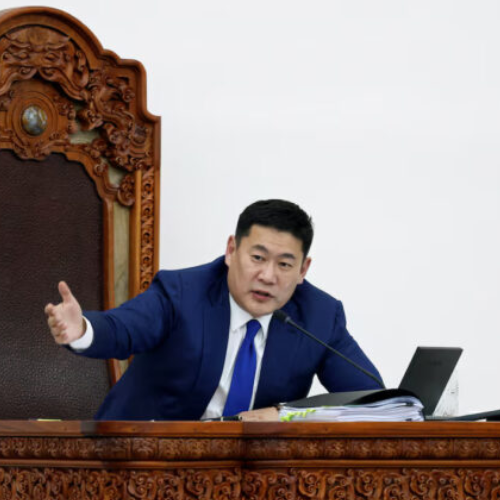The Prime Minister of Mongolia, Luvsannamsrain Oyun-Erdene, has stepped down after facing weeks of strong protests over corruption. People in Mongolia’s capital city, Ulaanbaatar, have been upset because they believe some government leaders are using the country’s wealth unfairly. Mongolia has struggled with corruption for many years, and many citizens feel that rich elites have been keeping the profits from the country’s coal mining boom instead of sharing them with everyone.
Growing Anger Over Lavish Spending Sparks Protests
The protests began after suspicions grew about the Prime Minister’s family living very lavish lifestyles. Reports and social media posts showed expensive gifts connected to Oyun-Erdene’s son’s fiancée, which made many Mongolians angry, especially as the cost of living keeps rising. This sparked large demonstrations in Ulaanbaatar, with many young people from Mongolia’s Generation Z joining to demand more honest and fair leadership.
Oyun-Erdene has denied the corruption allegations. In a speech to parliament before the vote that ended his leadership, he said that “major, visible and hidden interests” were working together in an “organized campaign” to bring down his government. But despite his defense, the protests continued to grow stronger.
Parliament Votes No Confidence, Forcing Resignation
The future of Oyun-Erdene as Prime Minister was decided in a secret vote in Mongolia’s 126-seat parliament. Only 44 lawmakers voted to keep him in office, while 38 voted against him. Oyun-Erdene needed at least 64 votes to remain Prime Minister, so he lost the confidence vote and announced his resignation.
Julian Dierkes, an expert on Mongolia at Germany’s University of Mannheim, said he does not expect any new leader to change policies much, especially on corruption. He also suggested that Oyun-Erdene’s resignation might lead to more political fighting within his party, the Mongolian People’s Party (MPP).
Since last year’s elections, Mongolia has been ruled by a coalition government made up of three parties. However, the MPP recently removed the Democratic Party (DP) from the coalition after some younger DP members supported calls for Oyun-Erdene to resign. During the confidence vote, Democratic Party lawmakers even walked out of the parliament chamber in protest.
Albanese Blasts Russian Indo-Pacific Claims, Labels Letter Authoritarian Rhetoric
What Does This Mean for Mongolia?
The protests and parliamentary vote show that many Mongolians want their leaders to be more honest and transparent. Munkhnaran Bayarlkhagva, a political analyst and former adviser to Mongolia’s National Security Council, said the protests helped question the legitimacy of the country’s political system. He praised Mongolia’s young people, saying Generation Z showed they are willing to be active and mature voters.
Mongolia is a landlocked country between two large neighbors, China and Russia. It used to be a communist country but became a democracy after the Soviet Union collapsed. Since Oyun-Erdene became Prime Minister in 2021, Mongolia’s ranking on the Corruption Perceptions Index has fallen, showing growing concerns about corruption.
Many Mongolians also worry about the economy and the rising cost of living, which has added to their frustrations. Erchissaran Ganbold, a 28-year-old small business owner, told AFP at one protest that the parliament’s vote was “a strong reminder for politicians to be accountable and transparent in the future.” Some older counter-protesters have also shown support for Oyun-Erdene in recent weeks, but the public demand for change was clear.
Mongolia and Japan Sign Landmark Defense Agreement
The resignation of Prime Minister Oyun-Erdene marks a significant moment in Mongolia’s political history, reflecting deep public anger over corruption and the desire for more fairness and honesty from the country’s leaders.

